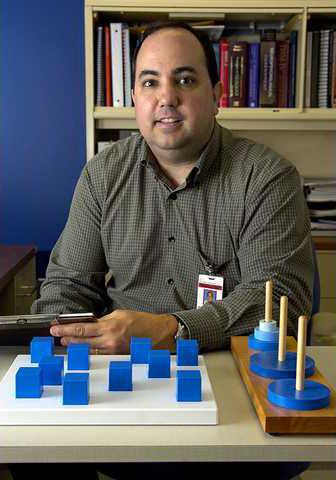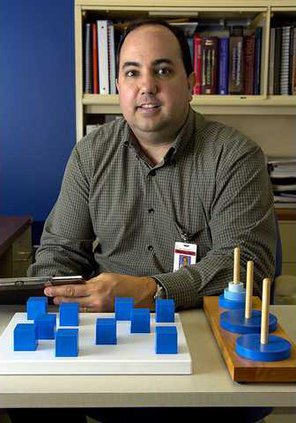0330brainaud
James Mullin explains why he decided to become a neuropsychologist.Healthy Monday
Every Monday The Times looks at topics affecting your health.
If you have a topic or issue you would like to see covered in our weekly series, contact health reporter Debbie Gilbert at dgilbert@gainesvilletimes.com or 770-718-3407.
Previous articles in the series can be found online at gainesvilletimes.com.
Contact
The Rehabilitation Institute at Northeast Georgia Medical Center: 770-219-8218
Using old-fashioned materials such as pencil and paper, Dr. James Mullin can tell you more about how your brain works than you could learn from any fancy imaging scan.
"A CT or MRI can show what’s wrong with the brain structurally," he said, "but it can’t tell you what the patient can actually do."
Mullin, who has worked at Northeast Georgia Medical Center’s Rehabilitation Institute for almost seven years, is one of only about a dozen certified neuropsychologists in Georgia.
"It’s kind of unusual for a hospital of this size to have a neuropsychologist on staff," he said.
Neuropsychologists are experts in human behavior, but they’ve received additional training to understand how disorders within the brain affect the way we think and act.
Originally from Ohio, Mullin earned his doctorate in clinical psychology at Central Michigan University, then did a residency in neuropsychology at the Shepherd Center and Emory Center for Rehabilitation Medicine in Atlanta.
At Northeast Georgia Medical Center, he works in the ReGain program, which helps people recover function after a stroke, traumatic brain injury or other neurological condition.
Mullin said he has been fascinated by the interface between psychology and the brain ever since he was a teenager, when a friend suffered a traumatic brain injury in a skiing accident.
"His personality was completely changed after the brain injury," Mullin said. "I was always interested in what could have caused that."
Kevin Gohman, director of inpatient rehabilitation at the medical center, said when the brain is damaged, the prognosis may not be as hopeless as patients believe.
"People can improve significantly," he said. "The brain does a good job of adapting and reorganizing itself."
But recovery is hard work, Gohman said.
"It’s very difficult for patients who are going through three hours a day of intensive rehab to deal with the emotional and psychological component," he said. "Behaviors such as depression and anxiety can impact the rehab plan. Dr. Mullin can determine whether the cause is psychological or neurological, and he makes recommendations (for treatment) to the physician."
Besides working with inpatient rehab, Mullin gets plenty of referrals from physicians in the community who suspect a patient has dementia.
"It’s important to tease out depression during the assessment, because depression can cause cognitive impairment," Mullin said. "Once you treat the depression, it may turn out the patient never actually had dementia."
To figure out what’s going on inside a patient’s head, Mullin spends much of his time conducting tests. There are no electrodes, no x-rays, just one human being talking to another.
"It’s mostly interactive, paper-and-pencil-type stuff, looking at puzzles," Mullin said. "It takes a large portion of the day. People tell me they feel like they’re back in school or they’re on a game show."
But it’s not a game. The tests can reveal deficits in memory, attention, concentration, language, visual-spatial skills and other brain functions.
Gohman said Mullin is particularly adept at evaluating dementia patients.
"He helps us assess their problem-solving ability, their level of judgment, which helps us decide whether it’s safe for the patient to be alone," Gohman said. "He works with the families as well, helping them to manage what’s going on with the patient."
Mullin said the demand for neuropsychologists is growing, partly because of the increasing incidence of Alzheimer’s disease.
"As the population ages, there’s going to be more people who need assessment (for dementia)," he said. "The fellowships to get into the (neuropsychology) program are pretty competitive."
Gohman said because of his unique mix of skills and training, Mullin fills a special niche at the rehab institute.
"We would be less effective if he wasn’t a part of the team," Gohman said.

